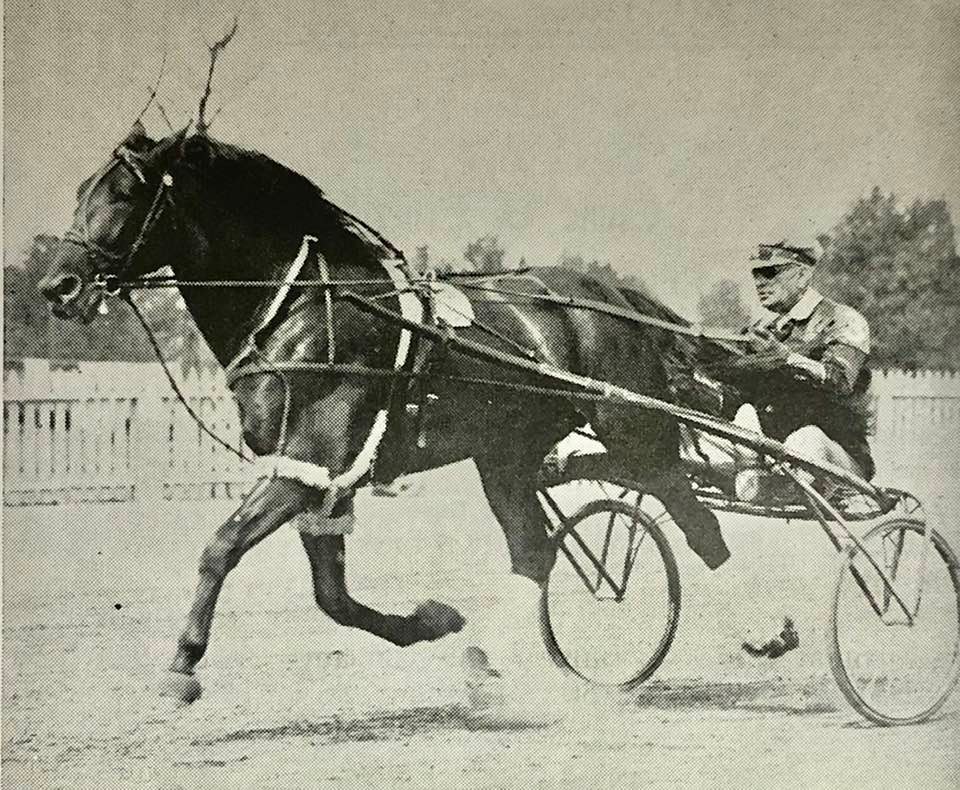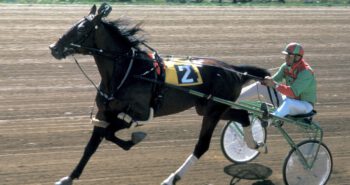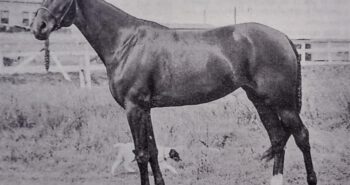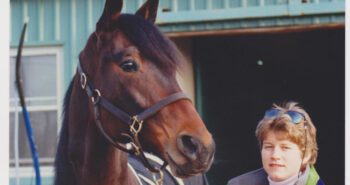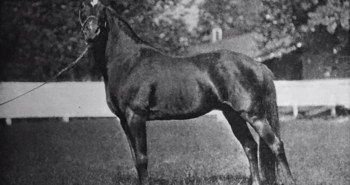He had a fantastic pedigree and came off a two-year-old season in which he set a world record. That did not prompt the owner to keep him: given that Calumet Farm was converting to a thoroughbred operation, the colt was put up for auction at the end of that season. Not surprisingly, Calumet Chuck became the most expensive sale at the auction. However, his three-year-old season was winless and full of frustration – but he got some revenge at stud.
With a fantastic pedigree, much were expected of Calumet Chuck as he was by Truax and out of the fast Sumatra, 2:02 1/2 (1.16,1). As soon as the two-year-olds of 1931 started trotting that July, Calumet Chuck immediately proved to be among the better in the crop, though he struggled to beat a few of the best in the beginning.
His career started with a third place finish, behind Brevere and Hollyrood Robin, at the Rainy Day stakes at North Randall. When the Grand Circuit moved to Kalamazoo he could only muster a fourth place in the group crop, the top two unchanged from North Randall but future Hambletonian winner The Marchioness now snuck her way ahead of Calumet Chuck in the final standings. At the Thorncliffe track in Toronto he first took second spot behind The Marchioness, with Brevere and Hollyrood Robin absent, while the second race there was won by Hollyrood Robin and Chuck had to settle for fourth behind his three nemeses. In the American Horse Breeder Junior Futurity he again had to settle for second honors behind Brever as the Peter the Brewer son again proved too strong. Both the Good Time Two-year-old trot and the Horse Review Futurity at Springfield, IL, proved similar as he had to settle for second and fourth, but as the Grand Circuit moved to Lexington, Chuck was steadily improving and coming into his prime. The Horse Review had hinted of things to come: even though The Marchioness proved the strongest, Calumet Chuck’s win in the second heat was in a season record 2:04 1/2 (1.17,4).
As The Marchioness’ one-year older brother Protector won the 1931 Kentucky Futurity in what most saw as a foregone conclusion anyway, the Junior Kentucky Futurity was seen as a more open contest. The Marchioness had won the first heat with relative ease in 2:04 1/2 (1.17,4). Maid McElwyn, who had broke in the first heat, won the second heat in a new world record 2:02 1/4 (1.16,0) after taking the early lead and setting a fast tempo. Calumet Chuck was second to Maid McElwyn but lost by a length. In the first heat Maid McElwyn was again in the lead but Chuck came on strong and beat the filly in the last few strides in 2:04 (1.17,1). The race-off between the three heat winners looked to belong to The Marchioness who took the early lead but Calumet Chuck again delivered his trademark strong finish and caught her a few yards from the wire to win in 2:08 1/4 (1.19,7). The win set a new world record for four heats for two-year-old.
Both the two-year-old editions of the Horse Review and Kentucky Futurities had gone to four grueling heats and soon there were demands from horsemen for a rule change that would limit two-year-olds to no more than three heats. They were heard, and starting the following year, two-year-olds would go no more than three heats. As a result, Calumet Chuck is one of the few, presumably, eternal world record holders.
The auction record
As Chuck was getting better and better on the track, his owner was doing worse and worse. In the winter of 1931, owner William M Wright, founder of Calumet Farm and a Hambletonian Society director, suffered a stroke and slipped into a coma. He won never see his horses race again, and missed both Calumet Butler’s Hambletonian victory and Calumet Chuck’s world record. This also meant there would be ownership changes. While William M Wright was a standardbred fan, his son Warren had a love for thoroughbreds and decided very quickly to convert the famed Lexington farm to the runners. In late September of that year, Warren Wright announced that Calumet Chuck, along with the rest of the Calumet-owned standardbreds, including Calumet Butler, would be sold at the Old Glory auction in New York come November. Only three trotters were “spared”: the legendary matrons Nervolo Belle, Sienna and Zombrewer were allowed live out their days at Calumet. Sienna, of course, is the maternal grandam of Calumet Chuck.
At the auction it was expected that Calumet Chuck would be the most expensive. Few thought he would fetch a price high enough to beat the auction record held by Legality, who had sold for $18,000 to a German buyer the previous year. However, when Calumet Chuck entered the auction ring it quickly turned into a bidding war between Hanover Shoe Farms and TJ McKinney of Buffalo. Lawrence Sheppard surely wanted the excellent Hambletonian hopeful and stallion prospect, but McKinney was also prepared to pay big money for Chuck. In the end the world record holder fetched a record $19,500. This was not the only big money transfer from Calumet to Hanover that year, as they also paid $10,000 for champion two-year-old pacer Calumet Cheater, who was then renamed Rip Hanover. It would have fit in with the tradition at the time to rename Calumet Chuck, but for some reason Sheppard didn’t do what he had done with other purchases such as Calumet Cheater, Mr Watt and McLin, the latter two renamed to Dean Hanover and McLin Hanover, respectively.
A winless season
In the winter Chuck was rated third favorite at 5:1 for the upcoming Hambletonian behind Maid McElwyn (5:2) and The Lad (4:1). In the Matron Stakes at North Randall in June, Calumet Chuck finished third after being runner-up in all three heats, losing all three heats by a nose. In the Stallion stake at North Randall he finished fourth courtesy of a 2-3-2 heat record. When he was runner-up in all three heats of the Peninsular Farm State at Toledo in July, Calumet Chuck had the unenviable record of being 0-8-1 in his first 9 heats in 1932. As he finished 3-2-3 in three heats at Hartford, Calumet Chuck had gone from third favorite to a mere outside contender for the Hambletonian. The previous year Calumet Butler won only one race – the Hambletonian – and when Chuck got post position 1 hopes improved that he would repeat the feat of his former stablemate. But Calumet Chuck was nowhere near glory as he finished 4-4-5 in the first three heats and when The Marchioness, Invader and Hollyrood Dennis went out for the final heat, the Hanover hopeful was already in the barn resting.
The Marchioness also proved impossible as Chuck had to settle for runner-up spots in both heats of the Illinois Futurity at Springfield, and the story repeated itself in the Horseman Futurity. The winless season was rounded off with once again being runner-up – what else? – to The Marchioness in the Kentucky Futurity.
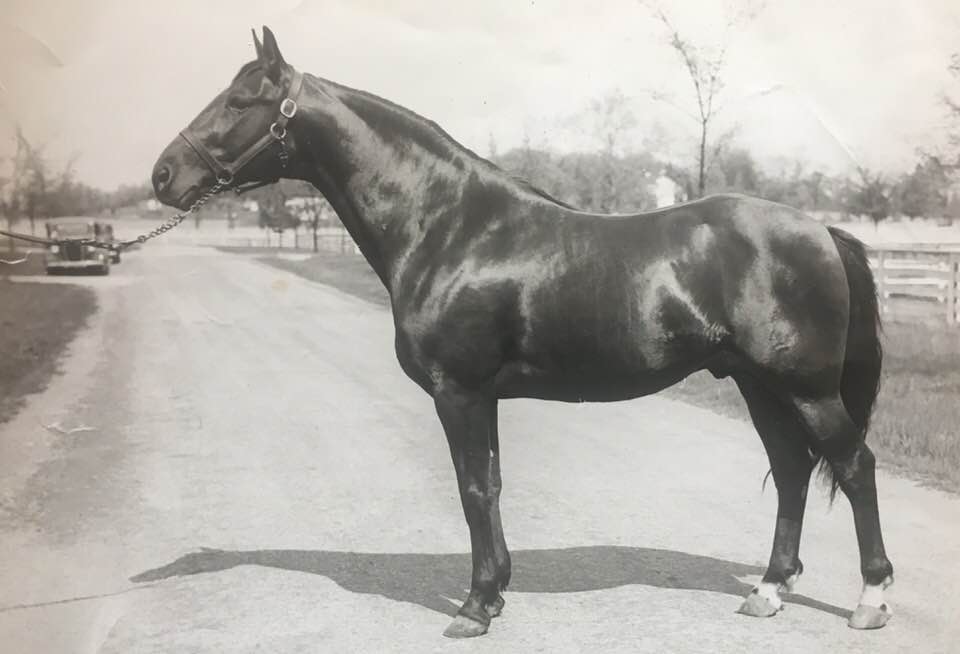
Calumet Chuck was retired to stud at Hanover Shoe Farms despite, somewhat oddly, only winning one race in his career, the 1931 Junior Kentucky Futurity. At stud he produced two big stars in Nibble Hanover and Titan Hanover, but was a bit inconsistent. His get very often early: in 1937 he led all sires in 2:10 two-year-old performers. However, while many were early bloomers they tended to peak at “good”, not “excellent”, and struggled to compete against the very best.
The sireline through Titan Hanover’s son Hickory Smoke lived on for many years through the latter’s son Chiola Hanover and his descendants. He is the damsire of Diller Hanover and Ford Hanover, winners of the 1959 Hambletonian and 1951 Kentucky Futurity respectively.
Calumet Chuck died relatively young, only 14 years old, in 1943.
Calumet Chuck
Bay colt born in Lexington, KY in 1929. Died in Hanover, PA on Mar 26, 1943.
Truax – Sumatra (Belwin)
2, 2:09 (1.17,1)
Breeder: Calumet Farm
Owners: Calumet Farm – Hanover Shoe Farms
Trainers: Dick MacMahon and Tom Berry
Drivers: Dick MacMahon and Tom Berry
Groom: –

